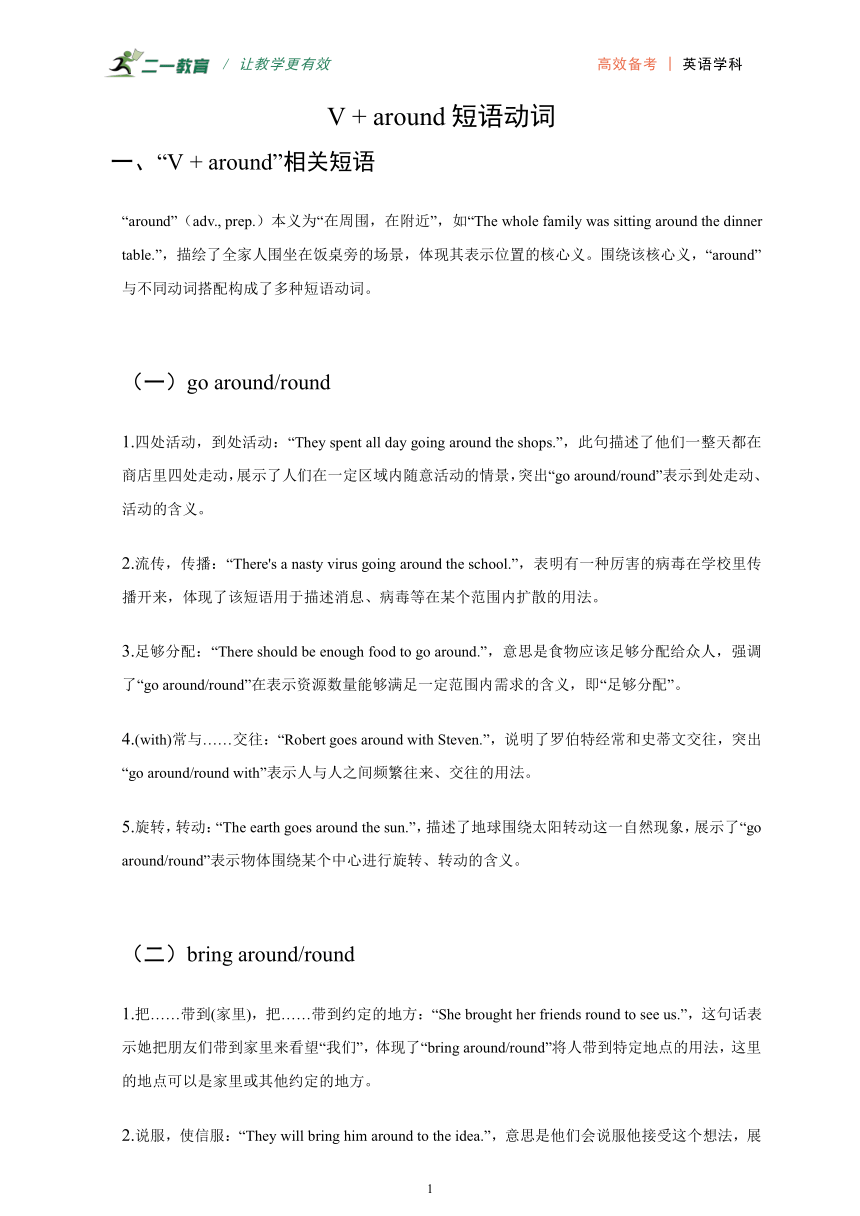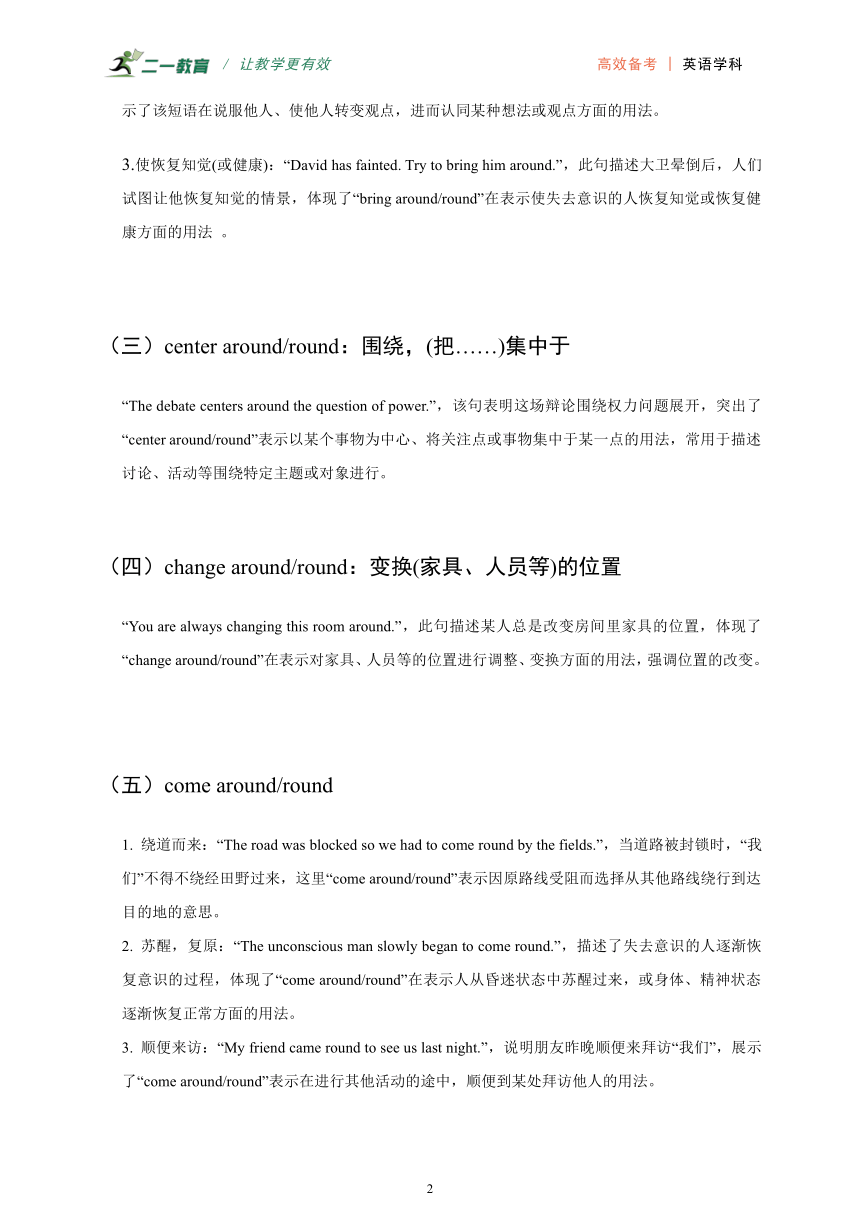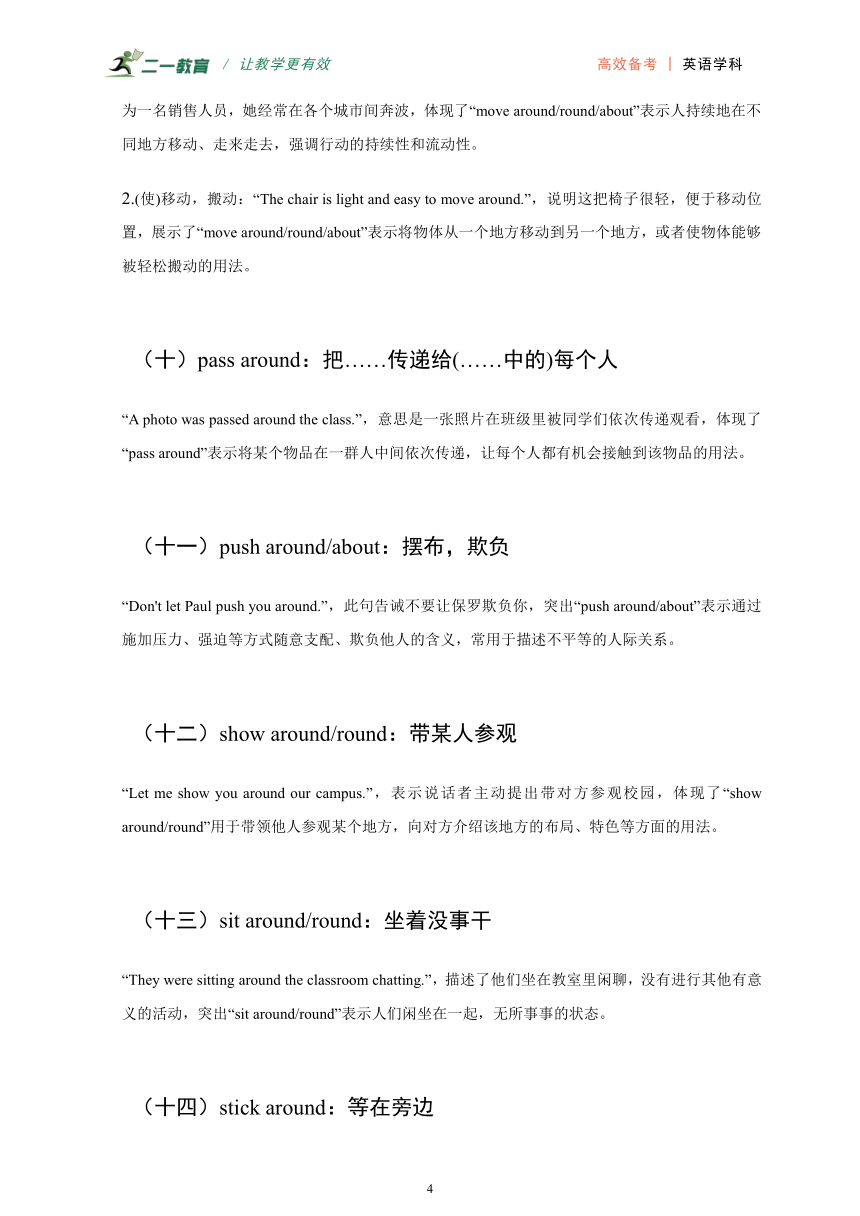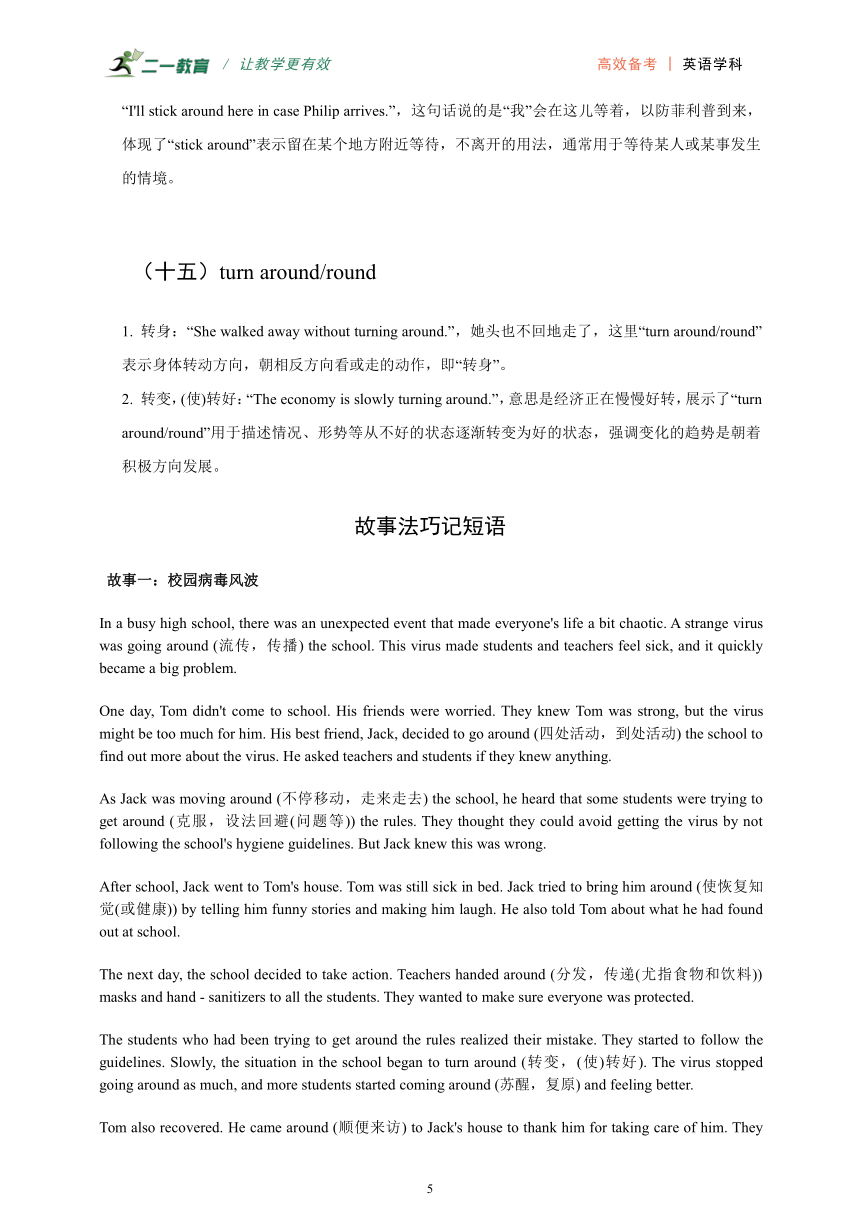04 around动词短语-高中英语高频动词短语速记
文档属性
| 名称 | 04 around动词短语-高中英语高频动词短语速记 |

|
|
| 格式 | docx | ||
| 文件大小 | 281.5KB | ||
| 资源类型 | 试卷 | ||
| 版本资源 | 通用版 | ||
| 科目 | 英语 | ||
| 更新时间 | 2025-04-29 16:21:26 | ||
图片预览





文档简介
/ 让教学更有效 高效备考 | 英语学科
V + around短语动词
一、“V + around”相关短语
“around”(adv., prep.)本义为“在周围,在附近”,如“The whole family was sitting around the dinner table.”,描绘了全家人围坐在饭桌旁的场景,体现其表示位置的核心义。围绕该核心义,“around”与不同动词搭配构成了多种短语动词。
(一)go around/round
1.四处活动,到处活动:“They spent all day going around the shops.”,此句描述了他们一整天都在商店里四处走动,展示了人们在一定区域内随意活动的情景,突出“go around/round”表示到处走动、活动的含义。
2.流传,传播:“There's a nasty virus going around the school.”,表明有一种厉害的病毒在学校里传播开来,体现了该短语用于描述消息、病毒等在某个范围内扩散的用法。
3.足够分配:“There should be enough food to go around.”,意思是食物应该足够分配给众人,强调了“go around/round”在表示资源数量能够满足一定范围内需求的含义,即“足够分配”。
4.(with)常与……交往:“Robert goes around with Steven.”,说明了罗伯特经常和史蒂文交往,突出“go around/round with”表示人与人之间频繁往来、交往的用法。
5.旋转,转动:“The earth goes around the sun.”,描述了地球围绕太阳转动这一自然现象,展示了“go around/round”表示物体围绕某个中心进行旋转、转动的含义。
(二)bring around/round
1.把……带到(家里),把……带到约定的地方:“She brought her friends round to see us.”,这句话表示她把朋友们带到家里来看望“我们”,体现了“bring around/round”将人带到特定地点的用法,这里的地点可以是家里或其他约定的地方。
2.说服,使信服:“They will bring him around to the idea.”,意思是他们会说服他接受这个想法,展示了该短语在说服他人、使他人转变观点,进而认同某种想法或观点方面的用法。
3.使恢复知觉(或健康):“David has fainted. Try to bring him around.”,此句描述大卫晕倒后,人们试图让他恢复知觉的情景,体现了“bring around/round”在表示使失去意识的人恢复知觉或恢复健康方面的用法 。
(三)center around/round:围绕,(把……)集中于
“The debate centers around the question of power.”,该句表明这场辩论围绕权力问题展开,突出了“center around/round”表示以某个事物为中心、将关注点或事物集中于某一点的用法,常用于描述讨论、活动等围绕特定主题或对象进行。
(四)change around/round:变换(家具、人员等)的位置
“You are always changing this room around.”,此句描述某人总是改变房间里家具的位置,体现了“change around/round”在表示对家具、人员等的位置进行调整、变换方面的用法,强调位置的改变。
(五)come around/round
绕道而来:“The road was blocked so we had to come round by the fields.”,当道路被封锁时,“我们”不得不绕经田野过来,这里“come around/round”表示因原路线受阻而选择从其他路线绕行到达目的地的意思。
苏醒,复原:“The unconscious man slowly began to come round.”,描述了失去意识的人逐渐恢复意识的过程,体现了“come around/round”在表示人从昏迷状态中苏醒过来,或身体、精神状态逐渐恢复正常方面的用法。
顺便来访:“My friend came round to see us last night.”,说明朋友昨晚顺便来拜访“我们”,展示了“come around/round”表示在进行其他活动的途中,顺便到某处拜访他人的用法。
(六)get around/round
1.四处走动,到处旅行:“It's easy to get around Amsterdam on a bicycle.”,这句话说的是在阿姆斯特丹骑自行车出行很方便,体现了“get around/round”表示在某个地方能够自由地四处走动、到处旅行的含义,强调行动的便利性和自由性。
2.(消息、谣言等)传开,传出去:“Word soon got around that Professor Chen was going to England.”,表示陈教授要去英国的消息很快就传播开了,突出了“get around/round”用于描述消息、谣言等在人群中迅速传播,使很多人都知晓的用法。
3.克服,设法回避(问题等):“They are trying to find ways to get around the law.”,意思是他们试图寻找方法规避法律,展示了“get around/round”表示通过一些手段克服困难、避开问题或绕过规则、限制等方面的用法。
4.(to)抽出时间来做(或考虑):“He says he will get around to it next week.”,他说下周会抽出时间来处理这件事,体现了“get around/round to”表示在忙碌的事务中抽出时间去做某事或考虑某个问题的用法。
(七)hand around/round:分发,传递(尤指食物和饮料)
“Please hand around the sandwiches.”,这句话是让大家把三明治传递给周围的人,体现了“hand around/round”用于描述将食物、饮料等物品依次传递给在场的每个人,以便大家都能拿到的用法 。
(八)look around/round:游览,参观
“The students have gone to look around the museum.”,表明学生们去博物馆参观游览了,突出“look around/round”表示在某个地方四处看看,以了解该地方的情况,常用于参观景点、场所等语境。
(九)move around/round/about
1.不停移动,走来走去:“Being a sales woman, she is constantly moving around from city to city.”,作为一名销售人员,她经常在各个城市间奔波,体现了“move around/round/about”表示人持续地在不同地方移动、走来走去,强调行动的持续性和流动性。
2.(使)移动,搬动:“The chair is light and easy to move around.”,说明这把椅子很轻,便于移动位置,展示了“move around/round/about”表示将物体从一个地方移动到另一个地方,或者使物体能够被轻松搬动的用法。
(十)pass around:把……传递给(……中的)每个人
“A photo was passed around the class.”,意思是一张照片在班级里被同学们依次传递观看,体现了“pass around”表示将某个物品在一群人中间依次传递,让每个人都有机会接触到该物品的用法。
(十一)push around/about:摆布,欺负
“Don't let Paul push you around.”,此句告诫不要让保罗欺负你,突出“push around/about”表示通过施加压力、强迫等方式随意支配、欺负他人的含义,常用于描述不平等的人际关系。
(十二)show around/round:带某人参观
“Let me show you around our campus.”,表示说话者主动提出带对方参观校园,体现了“show around/round”用于带领他人参观某个地方,向对方介绍该地方的布局、特色等方面的用法。
(十三)sit around/round:坐着没事干
“They were sitting around the classroom chatting.”,描述了他们坐在教室里闲聊,没有进行其他有意义的活动,突出“sit around/round”表示人们闲坐在一起,无所事事的状态。
(十四)stick around:等在旁边
“I'll stick around here in case Philip arrives.”,这句话说的是“我”会在这儿等着,以防菲利普到来,体现了“stick around”表示留在某个地方附近等待,不离开的用法,通常用于等待某人或某事发生的情境。
(十五)turn around/round
转身:“She walked away without turning around.”,她头也不回地走了,这里“turn around/round”表示身体转动方向,朝相反方向看或走的动作,即“转身”。
转变,(使)转好:“The economy is slowly turning around.”,意思是经济正在慢慢好转,展示了“turn around/round”用于描述情况、形势等从不好的状态逐渐转变为好的状态,强调变化的趋势是朝着积极方向发展。
故事法巧记短语
故事一:校园病毒风波
In a busy high school, there was an unexpected event that made everyone's life a bit chaotic. A strange virus was going around (流传,传播) the school. This virus made students and teachers feel sick, and it quickly became a big problem.
One day, Tom didn't come to school. His friends were worried. They knew Tom was strong, but the virus might be too much for him. His best friend, Jack, decided to go around (四处活动,到处活动) the school to find out more about the virus. He asked teachers and students if they knew anything.
As Jack was moving around (不停移动,走来走去) the school, he heard that some students were trying to get around (克服,设法回避(问题等)) the rules. They thought they could avoid getting the virus by not following the school's hygiene guidelines. But Jack knew this was wrong.
After school, Jack went to Tom's house. Tom was still sick in bed. Jack tried to bring him around (使恢复知觉(或健康)) by telling him funny stories and making him laugh. He also told Tom about what he had found out at school.
The next day, the school decided to take action. Teachers handed around (分发,传递(尤指食物和饮料)) masks and hand - sanitizers to all the students. They wanted to make sure everyone was protected.
The students who had been trying to get around the rules realized their mistake. They started to follow the guidelines. Slowly, the situation in the school began to turn around (转变,(使)转好). The virus stopped going around as much, and more students started coming around (苏醒,复原) and feeling better.
Tom also recovered. He came around (顺便来访) to Jack's house to thank him for taking care of him. They both learned that it was important to follow the rules and look out for each other during tough times.
**中文翻译**:在一所忙碌的高中里,发生了一件意想不到的事,让大家的生活有些混乱。一种奇怪的病毒在学校里传播开来。这种病毒让学生和老师们都生病了,很快就成了一个大问题。
一天,汤姆没来上学。他的朋友们很担心。他们知道汤姆身体强壮,但这病毒可能让他吃不消。他最好的朋友杰克决定在学校里四处走动,了解更多关于这种病毒的情况。他询问老师和同学们是否知道些什么。
杰克在学校里四处走动时,听说有些学生试图规避规则。他们认为不遵守学校的卫生准则就能避免感染病毒。但杰克知道这是不对的。
放学后,杰克去了汤姆家。汤姆还卧病在床。杰克试图通过讲有趣的故事逗他笑,让他好起来。他还告诉汤姆自己在学校了解到的情况。
第二天,学校决定采取行动。老师们给所有学生分发口罩和洗手液,他们想确保每个人都受到保护。
那些试图规避规则的学生意识到了自己的错误。他们开始遵守准则。慢慢地,学校的情况开始好转。病毒传播得没那么厉害了,更多学生开始恢复健康,感觉也好多了。
汤姆也康复了。他顺便去杰克家感谢他的照顾。他们都明白了在困难时期遵守规则、相互照顾是很重要的。
故事二:小镇旅行奇遇
Last summer, a group of high school students decided to take a trip to a small town. They were excited to explore a new place and have some fun.
When they arrived in the town, they started to get around (四处走动,到处旅行) on foot. The town was small but full of interesting places. They looked around (游览,参观) the old buildings and learned about the town's history.
One of the students, Lily, noticed a beautiful garden. She asked if they could go in and look around. The owner of the garden was a kind old lady. She saw the students and invited them in. She showed them around (带某人参观) the garden, pointing out different kinds of flowers and plants.
As they were walking around the garden, they heard a strange noise. They all stopped and looked around. The old lady laughed and said it was just her pet rabbit moving around (不停移动,走来走去) in the bushes.
Later in the day, they found a local market. There were people selling all kinds of things. They walked around the market, looking at the different items. A man was passing around (把……传递给(……中的)每个人) samples of his homemade cookies. The students were happy to try them.
After a while, they decided to sit around (坐着没事干) in a small park and have a snack. They shared the food they had bought at the market. One of the boys, Sam, told funny stories, and everyone was laughing.
But then, they realized they had lost their way back to their hotel. They started to worry. They asked some locals for directions, but they still couldn't find the right way. Just when they were about to give up, a kind policeman came around (绕道而来). He showed them the way back to the hotel.
Thanks to the policeman, they finally got back safely. It was a day full of surprises and fun. They all agreed that it was one of the best trips they had ever had.
**中文翻译**:去年夏天,一群高中生决定去一个小镇旅行。他们很兴奋能探索新地方,找点乐子。
到达小镇后,他们开始步行四处逛逛。小镇虽小,但有很多有趣的地方。他们参观了古老的建筑,了解了小镇的历史。
其中一名学生莉莉注意到一个美丽的花园。她问大家能不能进去看看。花园的主人是一位和蔼的老妇人。她看到学生们,便邀请他们进去。她带着学生们参观花园,介绍不同种类的花卉和植物。
他们在花园里散步时,听到一阵奇怪的声音。大家都停下来四处张望。老妇人笑着说,那只是她的宠物兔子在灌木丛里动来动去。
那天晚些时候,他们发现了一个当地的市场。那里有人在卖各种各样的东西。他们在市场里四处走动,看着不同的商品。一个男人在给大家分发他自制的饼干样品。学生们很开心地品尝着。
过了一会儿,他们决定在一个小公园里坐下来吃点零食。他们分享在市场买的食物。其中一个男孩山姆讲着有趣的故事,大家都笑得很开心。
但随后,他们发现找不到回酒店的路了。他们开始担心起来。他们向一些当地人问路,但还是找不到正确的路。就在他们快要放弃的时候,一位好心的警察绕道过来了。他给他们指了回酒店的路。
多亏了这位警察,他们最终安全回到了酒店。这是充满惊喜和乐趣的一天。他们都认为这是他们经历过的最棒的旅行之一。
故事三:班级派对的欢乐时光
It was Friday, and the students in Class 3 were very excited. They were going to have a big party after school to celebrate the end of the exams.
As soon as the bell rang, the students started to move around (使移动,搬动) the desks and chairs to make more space for the party. They changed the classroom around (变换(家具、人员等)的位置) so that it looked like a party place.
Some students brought snacks from home. They handed around (分发,传递(尤指食物和饮料)) the chips, cookies, and drinks to everyone. There was music playing, and everyone was having a great time.
Tom and his friends were dancing and going around (四处活动,到处活动) the classroom. They were laughing and singing along with the music. Mary was sitting around (坐着没事干) with some of her friends, chatting and enjoying the snacks.
Suddenly, there was a loud knock on the door. Everyone stopped and looked around. It was their teacher, Mr. Smith. They were a bit worried at first, thinking they might be in trouble. But Mr. Smith just smiled and came in. He said he heard the music and decided to come around (顺便来访) and see what was going on.
Mr. Smith joined the party. He showed the students some funny dance moves, and everyone laughed even harder. The students passed around (把……传递给(……中的)每个人) a camera and took pictures of the fun moments.
As the party went on, some students started to play games. They played a game where they had to pass a ball around (把……传递给(……中的)每个人) quickly. If the music stopped and someone was holding the ball, they had to perform a show.
The party was a huge success. By the end of the day, everyone was tired but happy. They knew that this party would be a great memory for them. And they also learned that having fun together was an important part of school life.
**中文翻译**:周五,三班的学生们非常兴奋。放学后他们要举办一场盛大的派对,庆祝考试结束。
下课铃一响,学生们就开始挪动桌椅,为派对腾出更多空间。他们把教室布置了一番,让它看起来像个派对场地。
一些学生从家里带来了零食。他们把薯片、饼干和饮料分发给每个人。音乐响起,大家都玩得很开心。
汤姆和他的朋友们在教室里跳舞、四处活动。他们跟着音乐又笑又唱。玛丽和她的一些朋友闲坐着,一边聊天一边享受着零食。
突然,一阵响亮的敲门声传来。大家都停下来四处张望。是他们的老师史密斯先生。一开始他们有点担心,觉得可能要惹麻烦了。但史密斯先生只是微笑着走了进来。他说他听到了音乐声,决定顺便过来看看发生了什么事。
史密斯先生加入了派对。他给学生们展示了一些有趣的舞蹈动作,大家笑得更厉害了。学生们传着相机,拍下了这些欢乐的瞬间。
随着派对的进行,一些学生开始玩游戏。他们玩了一个游戏,需要快速传递一个球。如果音乐停止时,有人拿着球,就得表演一个节目。
派对非常成功。一天结束时,每个人都很累,但都很开心。他们知道这场派对会成为他们美好的回忆。他们也明白了一起玩耍是校园生活的重要组成部分。
21世纪教育网 www.21cnjy.com 精品试卷·第 2 页 (共 2 页)
V + around短语动词
一、“V + around”相关短语
“around”(adv., prep.)本义为“在周围,在附近”,如“The whole family was sitting around the dinner table.”,描绘了全家人围坐在饭桌旁的场景,体现其表示位置的核心义。围绕该核心义,“around”与不同动词搭配构成了多种短语动词。
(一)go around/round
1.四处活动,到处活动:“They spent all day going around the shops.”,此句描述了他们一整天都在商店里四处走动,展示了人们在一定区域内随意活动的情景,突出“go around/round”表示到处走动、活动的含义。
2.流传,传播:“There's a nasty virus going around the school.”,表明有一种厉害的病毒在学校里传播开来,体现了该短语用于描述消息、病毒等在某个范围内扩散的用法。
3.足够分配:“There should be enough food to go around.”,意思是食物应该足够分配给众人,强调了“go around/round”在表示资源数量能够满足一定范围内需求的含义,即“足够分配”。
4.(with)常与……交往:“Robert goes around with Steven.”,说明了罗伯特经常和史蒂文交往,突出“go around/round with”表示人与人之间频繁往来、交往的用法。
5.旋转,转动:“The earth goes around the sun.”,描述了地球围绕太阳转动这一自然现象,展示了“go around/round”表示物体围绕某个中心进行旋转、转动的含义。
(二)bring around/round
1.把……带到(家里),把……带到约定的地方:“She brought her friends round to see us.”,这句话表示她把朋友们带到家里来看望“我们”,体现了“bring around/round”将人带到特定地点的用法,这里的地点可以是家里或其他约定的地方。
2.说服,使信服:“They will bring him around to the idea.”,意思是他们会说服他接受这个想法,展示了该短语在说服他人、使他人转变观点,进而认同某种想法或观点方面的用法。
3.使恢复知觉(或健康):“David has fainted. Try to bring him around.”,此句描述大卫晕倒后,人们试图让他恢复知觉的情景,体现了“bring around/round”在表示使失去意识的人恢复知觉或恢复健康方面的用法 。
(三)center around/round:围绕,(把……)集中于
“The debate centers around the question of power.”,该句表明这场辩论围绕权力问题展开,突出了“center around/round”表示以某个事物为中心、将关注点或事物集中于某一点的用法,常用于描述讨论、活动等围绕特定主题或对象进行。
(四)change around/round:变换(家具、人员等)的位置
“You are always changing this room around.”,此句描述某人总是改变房间里家具的位置,体现了“change around/round”在表示对家具、人员等的位置进行调整、变换方面的用法,强调位置的改变。
(五)come around/round
绕道而来:“The road was blocked so we had to come round by the fields.”,当道路被封锁时,“我们”不得不绕经田野过来,这里“come around/round”表示因原路线受阻而选择从其他路线绕行到达目的地的意思。
苏醒,复原:“The unconscious man slowly began to come round.”,描述了失去意识的人逐渐恢复意识的过程,体现了“come around/round”在表示人从昏迷状态中苏醒过来,或身体、精神状态逐渐恢复正常方面的用法。
顺便来访:“My friend came round to see us last night.”,说明朋友昨晚顺便来拜访“我们”,展示了“come around/round”表示在进行其他活动的途中,顺便到某处拜访他人的用法。
(六)get around/round
1.四处走动,到处旅行:“It's easy to get around Amsterdam on a bicycle.”,这句话说的是在阿姆斯特丹骑自行车出行很方便,体现了“get around/round”表示在某个地方能够自由地四处走动、到处旅行的含义,强调行动的便利性和自由性。
2.(消息、谣言等)传开,传出去:“Word soon got around that Professor Chen was going to England.”,表示陈教授要去英国的消息很快就传播开了,突出了“get around/round”用于描述消息、谣言等在人群中迅速传播,使很多人都知晓的用法。
3.克服,设法回避(问题等):“They are trying to find ways to get around the law.”,意思是他们试图寻找方法规避法律,展示了“get around/round”表示通过一些手段克服困难、避开问题或绕过规则、限制等方面的用法。
4.(to)抽出时间来做(或考虑):“He says he will get around to it next week.”,他说下周会抽出时间来处理这件事,体现了“get around/round to”表示在忙碌的事务中抽出时间去做某事或考虑某个问题的用法。
(七)hand around/round:分发,传递(尤指食物和饮料)
“Please hand around the sandwiches.”,这句话是让大家把三明治传递给周围的人,体现了“hand around/round”用于描述将食物、饮料等物品依次传递给在场的每个人,以便大家都能拿到的用法 。
(八)look around/round:游览,参观
“The students have gone to look around the museum.”,表明学生们去博物馆参观游览了,突出“look around/round”表示在某个地方四处看看,以了解该地方的情况,常用于参观景点、场所等语境。
(九)move around/round/about
1.不停移动,走来走去:“Being a sales woman, she is constantly moving around from city to city.”,作为一名销售人员,她经常在各个城市间奔波,体现了“move around/round/about”表示人持续地在不同地方移动、走来走去,强调行动的持续性和流动性。
2.(使)移动,搬动:“The chair is light and easy to move around.”,说明这把椅子很轻,便于移动位置,展示了“move around/round/about”表示将物体从一个地方移动到另一个地方,或者使物体能够被轻松搬动的用法。
(十)pass around:把……传递给(……中的)每个人
“A photo was passed around the class.”,意思是一张照片在班级里被同学们依次传递观看,体现了“pass around”表示将某个物品在一群人中间依次传递,让每个人都有机会接触到该物品的用法。
(十一)push around/about:摆布,欺负
“Don't let Paul push you around.”,此句告诫不要让保罗欺负你,突出“push around/about”表示通过施加压力、强迫等方式随意支配、欺负他人的含义,常用于描述不平等的人际关系。
(十二)show around/round:带某人参观
“Let me show you around our campus.”,表示说话者主动提出带对方参观校园,体现了“show around/round”用于带领他人参观某个地方,向对方介绍该地方的布局、特色等方面的用法。
(十三)sit around/round:坐着没事干
“They were sitting around the classroom chatting.”,描述了他们坐在教室里闲聊,没有进行其他有意义的活动,突出“sit around/round”表示人们闲坐在一起,无所事事的状态。
(十四)stick around:等在旁边
“I'll stick around here in case Philip arrives.”,这句话说的是“我”会在这儿等着,以防菲利普到来,体现了“stick around”表示留在某个地方附近等待,不离开的用法,通常用于等待某人或某事发生的情境。
(十五)turn around/round
转身:“She walked away without turning around.”,她头也不回地走了,这里“turn around/round”表示身体转动方向,朝相反方向看或走的动作,即“转身”。
转变,(使)转好:“The economy is slowly turning around.”,意思是经济正在慢慢好转,展示了“turn around/round”用于描述情况、形势等从不好的状态逐渐转变为好的状态,强调变化的趋势是朝着积极方向发展。
故事法巧记短语
故事一:校园病毒风波
In a busy high school, there was an unexpected event that made everyone's life a bit chaotic. A strange virus was going around (流传,传播) the school. This virus made students and teachers feel sick, and it quickly became a big problem.
One day, Tom didn't come to school. His friends were worried. They knew Tom was strong, but the virus might be too much for him. His best friend, Jack, decided to go around (四处活动,到处活动) the school to find out more about the virus. He asked teachers and students if they knew anything.
As Jack was moving around (不停移动,走来走去) the school, he heard that some students were trying to get around (克服,设法回避(问题等)) the rules. They thought they could avoid getting the virus by not following the school's hygiene guidelines. But Jack knew this was wrong.
After school, Jack went to Tom's house. Tom was still sick in bed. Jack tried to bring him around (使恢复知觉(或健康)) by telling him funny stories and making him laugh. He also told Tom about what he had found out at school.
The next day, the school decided to take action. Teachers handed around (分发,传递(尤指食物和饮料)) masks and hand - sanitizers to all the students. They wanted to make sure everyone was protected.
The students who had been trying to get around the rules realized their mistake. They started to follow the guidelines. Slowly, the situation in the school began to turn around (转变,(使)转好). The virus stopped going around as much, and more students started coming around (苏醒,复原) and feeling better.
Tom also recovered. He came around (顺便来访) to Jack's house to thank him for taking care of him. They both learned that it was important to follow the rules and look out for each other during tough times.
**中文翻译**:在一所忙碌的高中里,发生了一件意想不到的事,让大家的生活有些混乱。一种奇怪的病毒在学校里传播开来。这种病毒让学生和老师们都生病了,很快就成了一个大问题。
一天,汤姆没来上学。他的朋友们很担心。他们知道汤姆身体强壮,但这病毒可能让他吃不消。他最好的朋友杰克决定在学校里四处走动,了解更多关于这种病毒的情况。他询问老师和同学们是否知道些什么。
杰克在学校里四处走动时,听说有些学生试图规避规则。他们认为不遵守学校的卫生准则就能避免感染病毒。但杰克知道这是不对的。
放学后,杰克去了汤姆家。汤姆还卧病在床。杰克试图通过讲有趣的故事逗他笑,让他好起来。他还告诉汤姆自己在学校了解到的情况。
第二天,学校决定采取行动。老师们给所有学生分发口罩和洗手液,他们想确保每个人都受到保护。
那些试图规避规则的学生意识到了自己的错误。他们开始遵守准则。慢慢地,学校的情况开始好转。病毒传播得没那么厉害了,更多学生开始恢复健康,感觉也好多了。
汤姆也康复了。他顺便去杰克家感谢他的照顾。他们都明白了在困难时期遵守规则、相互照顾是很重要的。
故事二:小镇旅行奇遇
Last summer, a group of high school students decided to take a trip to a small town. They were excited to explore a new place and have some fun.
When they arrived in the town, they started to get around (四处走动,到处旅行) on foot. The town was small but full of interesting places. They looked around (游览,参观) the old buildings and learned about the town's history.
One of the students, Lily, noticed a beautiful garden. She asked if they could go in and look around. The owner of the garden was a kind old lady. She saw the students and invited them in. She showed them around (带某人参观) the garden, pointing out different kinds of flowers and plants.
As they were walking around the garden, they heard a strange noise. They all stopped and looked around. The old lady laughed and said it was just her pet rabbit moving around (不停移动,走来走去) in the bushes.
Later in the day, they found a local market. There were people selling all kinds of things. They walked around the market, looking at the different items. A man was passing around (把……传递给(……中的)每个人) samples of his homemade cookies. The students were happy to try them.
After a while, they decided to sit around (坐着没事干) in a small park and have a snack. They shared the food they had bought at the market. One of the boys, Sam, told funny stories, and everyone was laughing.
But then, they realized they had lost their way back to their hotel. They started to worry. They asked some locals for directions, but they still couldn't find the right way. Just when they were about to give up, a kind policeman came around (绕道而来). He showed them the way back to the hotel.
Thanks to the policeman, they finally got back safely. It was a day full of surprises and fun. They all agreed that it was one of the best trips they had ever had.
**中文翻译**:去年夏天,一群高中生决定去一个小镇旅行。他们很兴奋能探索新地方,找点乐子。
到达小镇后,他们开始步行四处逛逛。小镇虽小,但有很多有趣的地方。他们参观了古老的建筑,了解了小镇的历史。
其中一名学生莉莉注意到一个美丽的花园。她问大家能不能进去看看。花园的主人是一位和蔼的老妇人。她看到学生们,便邀请他们进去。她带着学生们参观花园,介绍不同种类的花卉和植物。
他们在花园里散步时,听到一阵奇怪的声音。大家都停下来四处张望。老妇人笑着说,那只是她的宠物兔子在灌木丛里动来动去。
那天晚些时候,他们发现了一个当地的市场。那里有人在卖各种各样的东西。他们在市场里四处走动,看着不同的商品。一个男人在给大家分发他自制的饼干样品。学生们很开心地品尝着。
过了一会儿,他们决定在一个小公园里坐下来吃点零食。他们分享在市场买的食物。其中一个男孩山姆讲着有趣的故事,大家都笑得很开心。
但随后,他们发现找不到回酒店的路了。他们开始担心起来。他们向一些当地人问路,但还是找不到正确的路。就在他们快要放弃的时候,一位好心的警察绕道过来了。他给他们指了回酒店的路。
多亏了这位警察,他们最终安全回到了酒店。这是充满惊喜和乐趣的一天。他们都认为这是他们经历过的最棒的旅行之一。
故事三:班级派对的欢乐时光
It was Friday, and the students in Class 3 were very excited. They were going to have a big party after school to celebrate the end of the exams.
As soon as the bell rang, the students started to move around (使移动,搬动) the desks and chairs to make more space for the party. They changed the classroom around (变换(家具、人员等)的位置) so that it looked like a party place.
Some students brought snacks from home. They handed around (分发,传递(尤指食物和饮料)) the chips, cookies, and drinks to everyone. There was music playing, and everyone was having a great time.
Tom and his friends were dancing and going around (四处活动,到处活动) the classroom. They were laughing and singing along with the music. Mary was sitting around (坐着没事干) with some of her friends, chatting and enjoying the snacks.
Suddenly, there was a loud knock on the door. Everyone stopped and looked around. It was their teacher, Mr. Smith. They were a bit worried at first, thinking they might be in trouble. But Mr. Smith just smiled and came in. He said he heard the music and decided to come around (顺便来访) and see what was going on.
Mr. Smith joined the party. He showed the students some funny dance moves, and everyone laughed even harder. The students passed around (把……传递给(……中的)每个人) a camera and took pictures of the fun moments.
As the party went on, some students started to play games. They played a game where they had to pass a ball around (把……传递给(……中的)每个人) quickly. If the music stopped and someone was holding the ball, they had to perform a show.
The party was a huge success. By the end of the day, everyone was tired but happy. They knew that this party would be a great memory for them. And they also learned that having fun together was an important part of school life.
**中文翻译**:周五,三班的学生们非常兴奋。放学后他们要举办一场盛大的派对,庆祝考试结束。
下课铃一响,学生们就开始挪动桌椅,为派对腾出更多空间。他们把教室布置了一番,让它看起来像个派对场地。
一些学生从家里带来了零食。他们把薯片、饼干和饮料分发给每个人。音乐响起,大家都玩得很开心。
汤姆和他的朋友们在教室里跳舞、四处活动。他们跟着音乐又笑又唱。玛丽和她的一些朋友闲坐着,一边聊天一边享受着零食。
突然,一阵响亮的敲门声传来。大家都停下来四处张望。是他们的老师史密斯先生。一开始他们有点担心,觉得可能要惹麻烦了。但史密斯先生只是微笑着走了进来。他说他听到了音乐声,决定顺便过来看看发生了什么事。
史密斯先生加入了派对。他给学生们展示了一些有趣的舞蹈动作,大家笑得更厉害了。学生们传着相机,拍下了这些欢乐的瞬间。
随着派对的进行,一些学生开始玩游戏。他们玩了一个游戏,需要快速传递一个球。如果音乐停止时,有人拿着球,就得表演一个节目。
派对非常成功。一天结束时,每个人都很累,但都很开心。他们知道这场派对会成为他们美好的回忆。他们也明白了一起玩耍是校园生活的重要组成部分。
21世纪教育网 www.21cnjy.com 精品试卷·第 2 页 (共 2 页)
